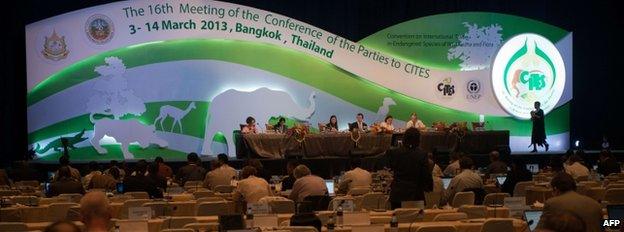Bangkok breakthroughs gives Cites a bigger stick
- Published
- comments

Amidst the great celebrations of a historic moment in the history of the Convention on International Trade in Endangered Species (Cites), when regulations on the trading of several shark species were upheld, one man stood looking a little forlorn.
For Shingo Ota, the spokesman for Japan's negotiating team in the conference hall, the debate and the result made it an unhappy day.
"It was not so pleasant to listen to all the clapping and sometimes screaming on the floor," he told me.
The upgrading of oceanic whitetip, porbeagle and hammerheads to Cites Appendix 2, external - mandating trade licenses and quotas - would not stop fishermen from catching these species, he said.
"Hammerheads are caught by small-scale fishermen - they don't care about Cites, the fins may not be exported now because of Cites listing but hammerheads will continue to die."
Sea change
Many people saw the decision, upheld by the tiniest of margins, as a major step forward for the 40-year-old convention.
Mark Jones from Humane Society International said that another decision on a complicated issue called Introduction from the Sea, external was seismic in its implications for the convention.
"I think it sets the framework by which Cites can become a global player in commercial fisheries management - and that's exactly what it ought to be," he said.
"A lot of species that are in commercial trade are being very adversely affected by that trade and not being effectively managed by the regional or national fishing bodies.
"We hope that in the future it will set the scene for many more commercial fish species to be listed under Cites."
China and Japan are certainly convinced that Cites aims to become the new sheriff of the high seas -and they don't like it at all.
"We are worried about the tendency from our standpoint," said Shingo Ota. "Cites is a trade tool - is that the best way to save species?"
Snake charmers
As well as the seas, this Cites meeting took aim at timber and listed several species of rare hardwoods, including ebony and rosewoods much in demand by the middle classes in China.
And big international companies came to this meeting because they see its growing importance.

Delegates managed to get to the heart of the issue on hardwoods such as ebony
Delegates from Gucci and other fashion houses were here in Bangkok to talk to the producers and suppliers of snake skins.
As several observers remarked, for Cites to move into regulating the international trade in fishing and forestry products affects many more people than in the past.
Perhaps the most important people affected are finance ministers in governments around the world.
We're now seeing Cites having an impact on areas that raise revenue and feed people. And what makes the treaty significant is that it has real teeth.
By some accident of birth, the founding fathers of Cites agreed that if a member broke the rules, they could be sanctioned across the entire range of species that Cites covers.
That's 35,000 increasingly lucrative species of flora and fauna.
Imagine how you'd respond if you were a finance minister in a country that was suddenly facing a to ban your international trading in timber or fish because you hadn't taken care of a species of frog?
As the world gets more populated over the next 30 years, as the pressure on the natural world continues to grow, we could be witnessing the emergence of a major new player on the world stage to balance trade with conservation.
Cites - It is a name many more people will have to get familiar with in the coming years.
Follow Matt on Twitter, external.